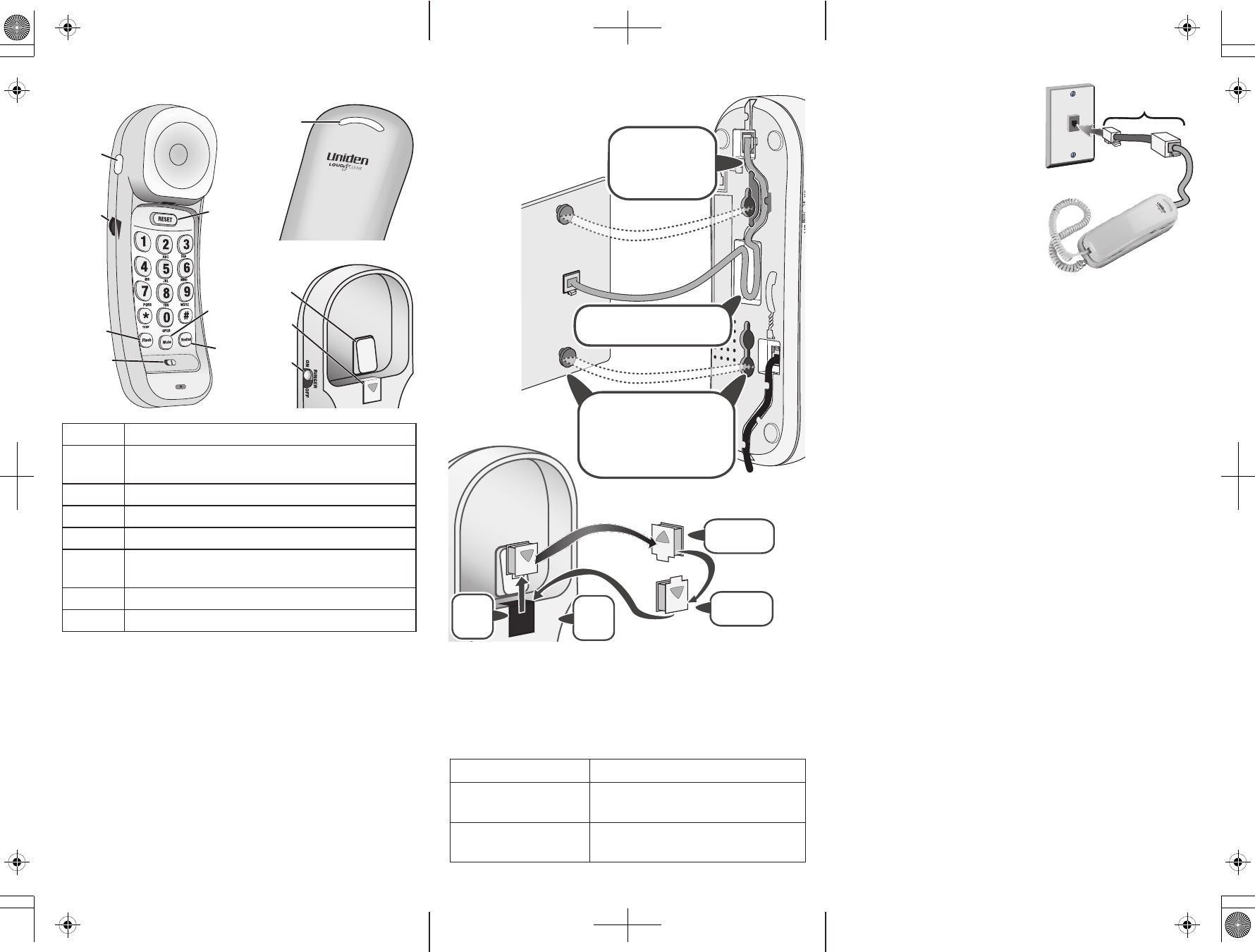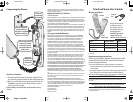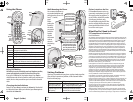
Fold
line
Fold
line
Fold
line
Fold
line
Using the Phone
Flash
button
Boost
button
Volume
dial
Reset
button
Redial
button
Mute
button
Tone/
pulse
switch
Visual
ringer
light
Hook
switch
Ringer
switch
Handset
clip
Button What it does
Boost and
Volume dial
These controls work together to change the volume. See
Changing the Audio Volume.
Flash During a call: switch to a waiting call
Tone/pulse Change the dial mode (see Solving Problems.)
Reset During a call: Hang up the current call and get a dial tone.
Mute
During a call: press & hold to mute the microphone so callers
can’t hear you. Release to turn the microphone back on.
Redial Redial the last number.
Ringer Turn the audio ringer (but not the visual ringer) o or on.
Using Call Waiting
Call waiting is service provided by your local telephone provider;
contact your telephone provider to subscribe to this service.
If you get a Call Waiting call, the handset beeps. Press Flash to
switch between the current call and the waiting call; each time you
switch, there’s a short pause before you're connected to the other
caller.
Changing the Audio Volume
During a call, press Boost to activate the Volume dial. Use the dial
to change the volume. When you’re nished, press Boost again to
deactivate the Volume dial.
Wall-Mounting the Phone
You can mount the phone on
any standard telephone wall
plate where the pins are 100
mm (3
15
/
16
inches)
apart.
Before
putting the
handset in
the cradle,
you need to
switch the
handset
clip into
wall mount
mode as
shown in
the drawing
below.
Solving Problems
If you have any trouble with your phone, try these simple steps rst.
If you still have a question or problem, call the Customer Hotline
listed on the front page.
Problem Things to try
I keep hearing a dial tone
when I try to make a call.
Checking the Tone/pulse switch: if it’s on
tone, change it to pulse and try again.
The phone rings, but I can't
hear anything.
Checking the coiled cord connection
between the base and the handset.
Connect the cords as
usual, but route the
line cord through
the inside channel.
Line up the notches on the
base with the pins on the
wall plate. Place the phone
over the plate and slide it
down to lock it into place.
Tuck excess line cord into the
space on the back of the phone.
Connect the cords as
usual, but route the
line cord through
the inside channel.
Line up the notches on the
base with the pins on the
wall plate. Place the phone
over the plate and slide it
down to lock it into place.
Tuck excess line cord into the
space on the back of the phone.
Flip the clip from
front to back.
Slide the
clip out of
its slot.
Rotate the clip
180 degrees.
Slide it
back into
the slot.
Flip the clip from
front to back.
Slide the
clip out of
its slot.
Rotate the clip
180 degrees.
Slide it
back into
the slot.
If there's static on the line
DSL broadband Internet service can
cause static on telephones, but a DSL
lter usually solves any problems. To
get a DSL lter, call your DSL provider
or look in any electronics store.
To install the lter, plug the DSL lter
into the wall jack and then plug your
phone into the lter. Make a test call
to see if the noise is gone.
What Else Do I Need to Know?
FCC compliance information
Part 68 information
This equipment complies with Part 68 of the FCC rules and the requirements adopted by the
ACTA. On the bottom of this equipment is a label that contains, among other information, a
product identier in the format US: 6NYTE##BXXXXXX (where XXXXXX stands for a specic
model number). If requested, this number must be provided to the telephone company.
An applicable Universal Service Order Codes (USOC) certication for the jacks used in this
equipment is provided (i.e., RJ11C) in the packaging with each piece of approved terminal
equipment. A plug and jack used to connect this equipment to the premises wiring and
telephone network must comply with the applicable FCC Part 68 rules and requirements
adopted by the ACTA. A compliant telephone cord and modular plug is provided with this
product. It is designed to be connected to a compatible modular jack that is also compliant.
See installation instructions for details.
The REN is used to determine the number of devices that may be connected to a telephone
line. Excessive RENs on a telephone line may result in the devices not ringing in response to
an incoming call. In most but not all areas, the sum of RENs should not exceed ve (5.0). To
be certain of the number of devices that may be connected to a line, as determined by the
total RENs, contact the telephone provider. The REN for this product is part of the product
identier that has the format US:6NYTE##BXXXXXX. The digits represented by ## are the
REN without a decimal point (e.g., 18 is a REN of 1.8).
If this equipment causes harm to the telephone network, the telephone company will
notify you in advance that temporary discontinuance of service may be required. But if
advance notice isn’t practical, the telephone company will notify the customer as soon
as possible. Also, you will be advised of your right to le a complaint with the FCC if
you believe it is necessary. The telephone company may make changes in its facilities,
equipment, operations or procedures that could aect the operation of the equipment. If
this happens the telephone company will provide advance notice in order for you to make
necessary modications to maintain uninterrupted service.
If the equipment is causing harm to the telephone network, the telephone company may
request that you disconnect the equipment until the problem is resolved.
Follow instructions for repairing, if any (e.g. battery replacement section); otherwise do not
substitute or repair any parts of the device except as specied in this manual. Should you
experience trouble with this equipment, contact Uniden customer service at 800-297-1023
to arrange repairs. All repairs must be done by Uniden or an authorized agent.
Connection to party line service is subject to state taris. Contact the state public utility
commission, public service commission or corporation commission for information. This
equipment is hearing aid compatible.
NOTICE: According to telephone company reports, AC electrical surges, typically resulting
from lightning strikes, are very destructive to telephone equipment connected to AC power
sources. To minimize damage from these types of surges, a surge arrestor is recommended.
DSL lter
Telephone
cord
Telephone
wall jack
DSL lter
Telephone
cord
Telephone
wall jack
Page 2 (inside)




